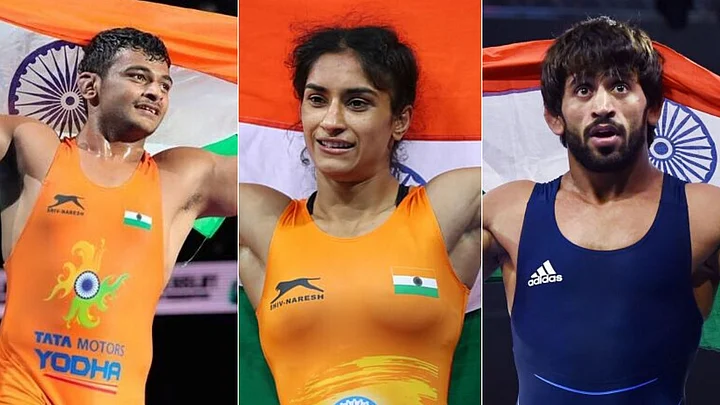The established names lived up to expectations for most part but what stood out for Indian wrestling in 2019 was the rise and rise of Deepak Punia amid a steady decline in the fortunes of Olympic trailblazers Sushil Kumar and Sakshi Malik.
Five medals and four Olympic quota places made this year's World Championships an unprecedented one for India's wrestlers.
The mega-stars - Bajrang Punia (65kg) and Vinesh Phogat (53kg) - delivered podium finishes along with Tokyo 2020 quotas but more than a bronze was expected of them.
Deepak (86kg), who was crowned junior world champion earlier this year, was the biggest takeaway from the worlds with a silver and an Olympic quota in his kitty.
He could well have pulled off a gold, the first since the iconic Sushil Kumar's path-breaking one back in 2010, but an ankle injury came in the way and he had to forfeit the final.
The icing on the cake came towards the end of the year when he was named the junior wrestler of the year by the sport's governing body United World Wrestling (UWW).
With his achievements, Deepak became another story of limited-means-maximum-success in Indian sports. The Haryana-lad's father used to sell milk and he first rose to prominence in 2016 with a cadet world championship gold.
In 2018, he managed just one medal at the senior level, but this year he pocketed two bronze and a silver before landing biggest second-place finish of his career in Nur Sultan.
A smooth transition from junior to senior circuit and the fact that he is world No.1 now has raised expectations from Deepak going into the Olympic year.
The more established Punia won every tournament he entered till the worlds. The gold medals came from Dan Kolov, Asian Championship, Ali Aliev and Yasar Dogu but his already-exposed leg defence was sorted by his rivals by the time the world event came along.
His unbeaten run was halted by Kazakhstan's Daulet Niyazbekov in Nur Sultan and it came as rude shock since he was the favourite to win the title as world No.1.
Bajrang cried foul after the loss, complaining that the judging favoured the home wrestler, but what was undeniable was also his tendency to concede early leads.
Against Niyazbekov, Bajrang trailed 2-8 at one stage in the bout.
Nevertheless, Bajrang consolidated his position as an undisputed star at the global stage with his supreme stamina and attacking style.
Currently ranked second in the world, Bajrang has already started the work on sorting out his vulnerable defence and has hired a new sparring partner in Russia's Viktor Rassadin at his training camp in Sonepat.
Another wrestler emerging from a humble background was 22-year-old Ravi Dahiya. His rock-solid technique, strong defence and above all, temperament, make him a strong contender for an Olympic medal.
His bronze medal at the worlds came as a surprise to many but he had shown his potential at the Pro League. In cool-headed Ravi, India can hope for more than one medal from its male grapplers in Tokyo.
Rahul Aware added to India’s tally with a bronze, albeit in the non-olympic 61kg category.
In a sport dominated by Haryana, the diminutive wrestler from Pune is trying to carry forward the legacy of the great KD Jadhav, who was independent India's first athlete to win an Olympic medal.
Vinesh Phogat further fuelled the rising Olympic medal hopes from her by claiming her first ever medal at the World Championship.
In one of the most competitive Olympic categories, the fiery Vinesh overpowered not just opponents but also a few demons in her head to gain confidence.
She showed that she can be at par with the best in this division with wins over top wrestlers, including then world No.1 Sarah Ann Hildebrandt, en route a bronze in Nur-Sultan.
However, for double Olympic-medallist Sushil Kumar and Rio 2016 bronze-winner Sakshi Malik, the year was a battle to stay relevant.
Both competed at the worlds after winning national trials but neither of them could last more than a round. The questions being asked of Sushil, 36, and his future are louder compared to the ones being posed to a much younger Sakshi, 27, who has been mostly underwhelming since her Olympic bronze.
But the future is looking increasingly bleak for her after she was dropped from the government's flagship Target Olympic Podium Scheme (TOPS) due to less-than-flattering performances this season.
The year ended only slightly positively for Sakshi when she claimed the national title in the 62kg category.
(At The Quint, we question everything. Play an active role in shaping our journalism by becoming a member today.)
